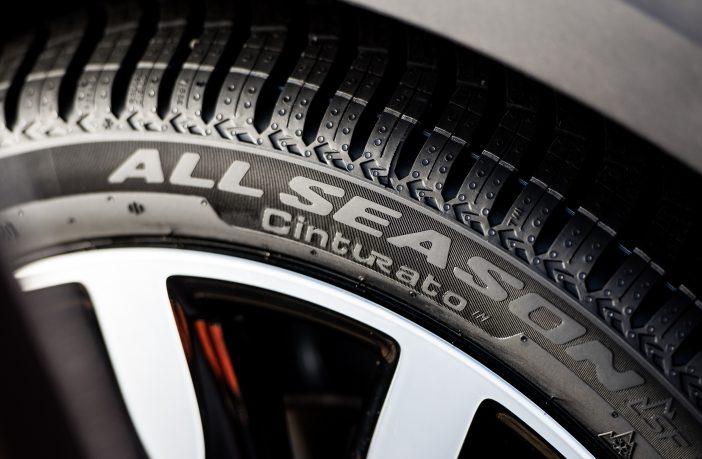Many car owners consider all-season tires in snow, but this may be a wrong assumption. Things are not as simple as you assume. The post will tell you!
Intro
As comes from the name, all-season tires may refer to the type of car tires that can be suitable to function in any weather condition, even on snowy roads.
Consequently, many drivers can’t tell snow tires and all-season tires apart and keep relying on the all-season tires in the winter. Let’s find out more with the article.
Are All Season Tires Good In Snow?

Briefly, all-season tires handle snow well, but they can’t be at their finest quality when activating in some specific snowy conditions, like hard-packed or deep snow.
All-season tires are innovative products for vehicles worldwide due to their versatile functionality in various terrains and natural conditions.
The tires can guarantee drivers stable and safe movement on rough terrains, wet or scorching conditions, or even under light snow in the winter. However, when it comes to heavy snow or snowstorms, winter tires, aka snow tires, will be the best choice for your travel.
When the temperature significantly drops to less than 7 Celsius degrees, AS tires’ traction can’t stay the same as in normal weather. Particularly on icy and slushy roads, the lack of studs in all-season tires will result in slippery driving and difficult control over the vehicle.
Besides, their tread compounds can’t achieve softness and flexibility like winter/snow tires.
What Are The Differences Between Winter Tires Vs All-Season Tires?
When you have a quick glance at these two tire types, you may think the winter tires are a branch of the all-season ones. Your assumption is not wrong, but it needs some clearer deduction.
The tires must be efficient to perform well every season to get the all-season title. However, they can’t be adequate to provide prominent traction on slippery icy, and snowy roads like the uniquely made-for-winter, winter/snow tires can.
You can focus on two primary sections related to tire tread that distinguish the performance of snow tires vs all-season tires:
- Compound: SUV All-season tires feature rubber compounds that can function well in hot and cold climates (not too extreme, though). Therefore, these tires may get stiffened in freezing weather leading to poor traction on the ground.
On the other hand, winter/snow tires are made from only-for-winter rubber so that they can ensure drivers with extreme softness and flexibility on snowy roads, even if the temperature is below freezing point.
- Pattern: Winter tires consist of slits or sipes, rarely found on all-season tires. These patterns will absorb the snow and watery slush to avoid slipping and boost the traction of the vehicle.
Some are even studdable to increase snow traction. Thanks to the special patterning, the grip of winter tires is improved to provide drivers with stable control over their cars.
In Which Snow Condition Can All-Season Tires Properly Function?
Robert Herrera at COR Wheels said: “All-season tires are produced for being used all year round. However, in winter, these tires are only appropriate to function under the light winter climate from above 7 degrees Celsius.”
Fresh, powdery snow is within their reach, with depth not surpassing 5 inches to ensure safety. You shouldn’t use all-season tires during the freezing time of the year on icy, slippery roads.
Snow tires are designed to serve purposes that all-season tires can’t complete, like smooth moving through batches of packed snow and stable steering on icy roads.
What To Check When Using All-Season Tires In Snow/Winter Condition?

If you are confused about snow and all-season tires to use in the winter, you should be clear about these two factors:
- The Real-time Temperature: As mentioned above, the recommended temperature for the proper activation of all-season tires is 7 degrees Celsius.
Hence, when the temperature drops below 7 degrees Celsius with the appearance of thick layers of snow and slippery freezing surfaces, you shouldn’t rely on a pack of all-season tires.
- The Quality And Types Of Routes: Sometimes, although the temp drops, ice won’t form, and snow build-up won’t interrupt your travel. The reasons lie in the area you plan to go through.
If the locals have solutions to wipe out the slush and keep the road slippery-free, all-season tires can still accomplish a decent job for you. However, you must be sure that the tires are regularly maintained under the finest conditions.
Bottom Lines
Believing all-season tires are good in snow is understandable because of the versatile functions of the tires. However, everything has its own limits, and so do the all-season tires.
Remember, the recommended temperature to opt for a set of AS tires in the winter is above 7 degrees Celsius. You will be responsible for your safety with careful choices.
Are All Season Tires Good In Snow? Should I Use Winter Tires?
Many car owners consider all-season tires in snow, but this may be a wrong assumption. Things are not as simple as you assume. The post will tell you!
Intro
As comes from the name, all-season tires may refer to the type of car tires that can be suitable to function in any weather condition, even on snowy roads.
Consequently, many drivers can’t tell snow tires and all-season tires apart and keep relying on the all-season tires in the winter. Let’s find out more with the article.
Are All Season Tires Good In Snow?

Briefly, all-season tires handle snow well, but they can’t be at their finest quality when activating in some specific snowy conditions, like hard-packed or deep snow.
All-season tires are innovative products for vehicles worldwide due to their versatile functionality in various terrains and natural conditions.
The tires can guarantee drivers stable and safe movement on rough terrains, wet or scorching conditions, or even under light snow in the winter. However, when it comes to heavy snow or snowstorms, winter tires, aka snow tires, will be the best choice for your travel.
When the temperature significantly drops to less than 7 Celsius degrees, AS tires’ traction can’t stay the same as in normal weather. Particularly on icy and slushy roads, the lack of studs in all-season tires will result in slippery driving and difficult control over the vehicle.
Besides, their tread compounds can’t achieve softness and flexibility like winter/snow tires.
What Are The Differences Between Winter Tires Vs All-Season Tires?
When you have a quick glance at these two tire types, you may think the winter tires are a branch of the all-season ones. Your assumption is not wrong, but it needs some clearer deduction.
The tires must be efficient to perform well every season to get the all-season title. However, they can’t be adequate to provide prominent traction on slippery icy, and snowy roads like the uniquely made-for-winter, winter/snow tires can.
You can focus on two primary sections related to tire tread that distinguish the performance of snow tires vs all-season tires:
- Compound: SUV All-season tires feature rubber compounds that can function well in hot and cold climates (not too extreme, though). Therefore, these tires may get stiffened in freezing weather leading to poor traction on the ground.
On the other hand, winter/snow tires are made from only-for-winter rubber so that they can ensure drivers with extreme softness and flexibility on snowy roads, even if the temperature is below freezing point.
- Pattern: Winter tires consist of slits or sipes, rarely found on all-season tires. These patterns will absorb the snow and watery slush to avoid slipping and boost the traction of the vehicle.
Some are even studdable to increase snow traction. Thanks to the special patterning, the grip of winter tires is improved to provide drivers with stable control over their cars.
In Which Snow Condition Can All-Season Tires Properly Function?
Robert Herrera at COR Wheels said: “All-season tires are produced for being used all year round. However, in winter, these tires are only appropriate to function under the light winter climate from above 7 degrees Celsius.”
Fresh, powdery snow is within their reach, with depth not surpassing 5 inches to ensure safety. You shouldn’t use all-season tires during the freezing time of the year on icy, slippery roads.
Snow tires are designed to serve purposes that all-season tires can’t complete, like smooth moving through batches of packed snow and stable steering on icy roads.
What To Check When Using All-Season Tires In Snow/Winter Condition?

If you are confused about snow and all-season tires to use in the winter, you should be clear about these two factors:
- The Real-time Temperature: As mentioned above, the recommended temperature for the proper activation of all-season tires is 7 degrees Celsius.
Hence, when the temperature drops below 7 degrees Celsius with the appearance of thick layers of snow and slippery freezing surfaces, you shouldn’t rely on a pack of all-season tires.
- The Quality And Types Of Routes: Sometimes, although the temp drops, ice won’t form, and snow build-up won’t interrupt your travel. The reasons lie in the area you plan to go through.
If the locals have solutions to wipe out the slush and keep the road slippery-free, all-season tires can still accomplish a decent job for you. However, you must be sure that the tires are regularly maintained under the finest conditions.
Bottom Lines
Believing all-season tires are good in snow is understandable because of the versatile functions of the tires. However, everything has its own limits, and so do the all-season tires.
Remember, the recommended temperature to opt for a set of AS tires in the winter is above 7 degrees Celsius. You will be responsible for your safety with careful choices.
Facebook Comments